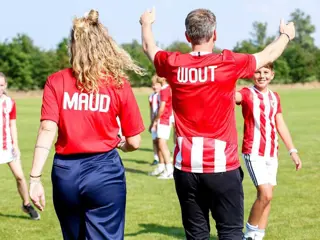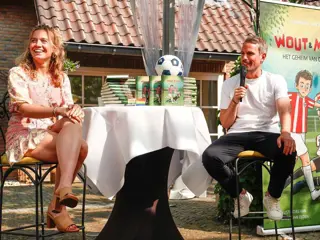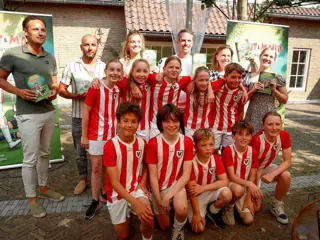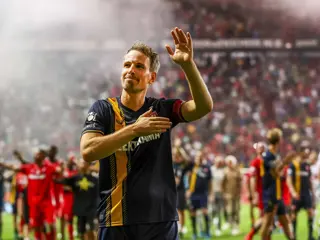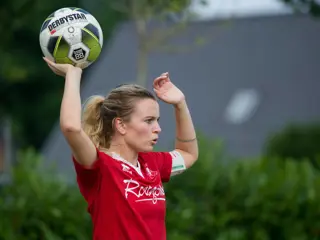Player Story
Wout and Maud: "We hope our book makes football more inclusive"
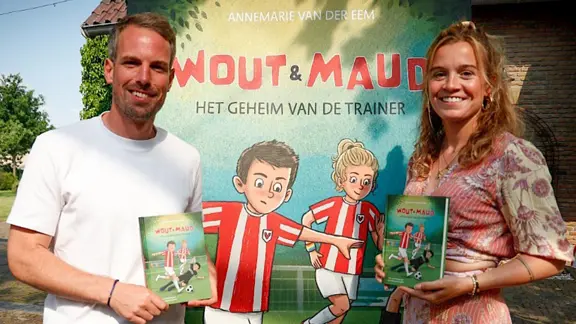
Seven players have been nominated by their unions for the 2023 FIFPRO Merit Awards. FIFPRO will announce the winners in the three different categories – Activism, Impact and Voice – during its annual general assembly in South Africa on Thursday 23 November.
Wout Brama and Maud Roetgering, who ended their respective careers after playing more than 15 years for Dutch club FC Twente, are among the nominees. Both are trying to make football more inclusive through their children’s book: Wout & Maud.
Wout Brama: “Wout & Maud has such a great ring to it. I thought we have to create a children’s book out of that. I told my wife, who was working with Maud, and a day later, she informed me Maud liked the idea.”
Maud Roetgering: “I enjoy brainstorming about new things. After a few hours of talking, we decided that creating a children’s book was an excellent idea.”
Wout: “We thought writing a children’s book just about young Wout and Maud playing football was too easy. If we attach our name to it, we should also have a message.”
Maud: “We’re both front and centre in society and wanted to give something back to the community.”
Wout: “Maud’s road to the top was very different from mine. Until she was 16, for example, she had not sat in a changing room with her team but was always alone in a referee’s booth or broom closet. Maud was the only girl on a boys’ team, so she missed out on the social group process I always experienced. That’s what we wanted to talk about.
“It also had to be about gay acceptance in the sport because it’s vastly different in men’s football than women’s football. Same-gender relationships are not an issue among women. It’s not an issue among men either: there’s a denial that gay players exist. But they are there, just not coming out of the closet. And that’s such a shame. Let’s try to make it easier. The overarching theme is that football is for everyone, and everyone should be able to enjoy it the way we did. We try to remove obstacles for everyone who feels different.”
Maud: “As we couldn’t write the book ourselves, we looked for a writer. She talked to us extensively about our ideas, our characters, and how we would behave as 12-year-olds with our team-mates. We used a lot of things that we’ve experienced ourselves, which made it easier to incorporate the themes in the book. I had to deal a lot with a lack of inclusion and diversity. I was timid and had to find my place in a boys’ team. Wout was free-spirited and happy. Sometimes when he said things, he thought, ‘Oh crap!’ afterwards, like in a scene in the book where he sings along to songs about gay people.”
Wout: “I really did that. I didn’t realise I was singing an anti-gay song – I was joining in with taunts aimed at the opposing team.”
Maud: “As I’m attracted to women, I’ve been dealing with gay acceptance all my life. That wasn’t always easy. I’ve also fought for equal opportunities in women’s football. I debuted at the highest level in 2009 and have witnessed considerable developments in the game.”
Wout: “The topics are more personal for you than for me. I thoroughly enjoyed the football, the changing-room atmosphere, and the different cultures and people. But the one type of person I never saw there was a gay man. And I find that very odd.”
Maud: “It makes no sense. If you look in the stands, you see such a mixed crowd: rich and poor, black and white, intelligent and slow-witted, disabled, gay, lesbian – everyone sits side by side. And yet, there is not one active gay male player in the biggest sport in the Netherlands.”
Wout: “Only three have come out of the closet worldwide: Josh Cavallo, Jake Daniels and Jakob Jankto.”
Maud: “That’s why, in the book, we deliberately chose to make a man gay, our team’s coach, as gay acceptance in women’s football is not an issue. I’m actually quite shocked by what our book has brought about. That we, two down-to-earth players from Twente, have written a book and suddenly find ourselves at the table of our country’s biggest talk show. For two football players to have a first in the children’s book industry with a football book on this topic, that’s quite bizarre, right?”
Wout: “We’ve had great coverage. Camera crews from all over attended our book launch, and I think we’ve talked about our book almost 100 times now, both with media and at sessions with parents and children. Those sessions are delightful. We were in a theatre the other day with 300 parents and children. I read a piece on crowd chants and then discussed it with the children. And those children talk about it again at home with their parents.”
Maud: “We met with 200 special education teachers the other week. They deal with inclusion daily as their pupils struggle to belong in society. Those were also interesting conversations.”
Wout: “Some municipalities buy books to hand out for free to new library members during a session. We come to sign, read aloud, and chat with those children.”
Maud: “We were recently guests of the Dutch Football Association (KNVB), which has launched a campaign with the government to combat racism and discrimination in football. There I was, sitting with the Minister for Sport on a panel. The KNVB has included our book in their tool kit. If clubs have problems with these themes, they can invite us to give their members a workshop on Wout & Maud.”
Wout: “We’ve had a lot of support from the John Blankenstein Foundation, an organisation that advocates for the LGBTQIA+ community’s interests in sport. They became our partner and have helped us market the book, for example.”
Maud: “And we’ve since been approached by parties wanting to participate in Part 2.”
Wout: “Our second book is about racism and discrimination, also a pressing issue. Before we started Part 1, we’d already thought about the sequels so that we could build on them in the next books. For example, Wout and Maud have a very diverse team.”
Maud: “We deliberately omitted topics in Part 1; we didn’t want it to have too many messages. It had to be a children’s adventure book with a subtle thread of these topics, without being overbearing.”
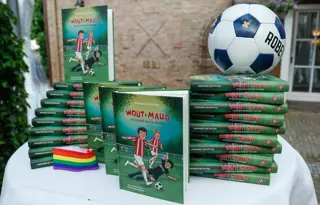
Wout: “Sales are exceeding expectations. Book industry experts advised us to have a maximum of 3,000 books printed, but we took a risk with a first print run of 5,000. As that one has already sold out, we’ve even ordered a second print run.”
Maud: “It’s a dream come true for me because I’m a reader. If I’d read our book as a 12-year-old, I think it would have been easier to start the conversation about some of the issues.”
Wout: “Perhaps our book will help a child say: ‘Dad, I’ve read this book; can we talk about it?’”
Maud: “Maybe it will help parents who suspect their son is gay. Give a child this book, and you might have an ice-breaker for a conversation.”
Wout: “We’ve learnt that you have to start the conversation and then create awareness. We’re under no illusion that this book will solve every problem, but we hope that we can change the world a little bit together.”
Maud: “We’ll keep doing this as long as we enjoy it and find it makes an impact. We hope to create a series of three books.”

